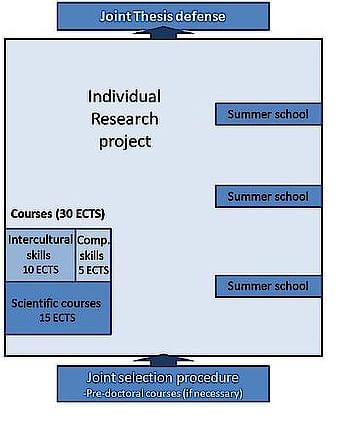PhD programme and mobility
Programme Structure
Note: The following information is only relevant for DocMASE students funded by the European Commission, not for those supported by the DAAD!
The joint doctoral programme DocMASE consists of an individual research project and a module of courses. The course module comprises 30 ECTS:

- 15 ECTS for scientific courses
- 10 ECTS for courses on intercultural skills
- 5 ECTS for courses on complementary skills
Research
Research activities are built around the following topics:
Thesis:
Candidates have to write a dissertation (doctoral thesis) relevant to on of the four research fields. It has to be a personal contribution to the advance of knowledge in the field with collaboration between at least two groups from different partner universities.
Co-mentorship:
The doctoral students will be co-mentored by professors of two universities of the consortium.
Seminars:
Attending scientific seminars as well as presenting individual research findings in seminars is compulsory.
Publications:
Students are required to publish their results in scientifically renowned peer-review journals as well as attend relevant conferences.
Thesis defense:
The scientific work has to be defended in a Colloquium that serves to approve the scientific qualification of the doctoral student. The thesis defence will be conducted in accordance with the rules and regulations of the student’s chosen universities.
Training
PhD students will benefit from training in the following areas:
Scientific courses:
Specialised post-graduate courses related to the research topics will be offered. The courses each doctoral student is supposed to attend will be selected on an individual basis, taking into account the background of the candidate and the requirements of their specific research work.
Intercultural skills:
Courses and seminars related to international and intercultural competences will be available to each candidate. Examples of contents are: training in intercultural communication, international project management, or dealing with international customers. Furthermore, language courses will be offered and can be attended to complete the 10 ECTS.
Complementary skills:
Courses and seminars as defined for each candidate by each university will be provided by universities or by industrial partners. Some examples are:
- Personal/social competences: body language & voice, rhetoric, emotional intelligence, conflict management, global communication.
- Information retrieval, personal organisation & effectiveness; publication & thesis writing.
- Professional issues in science: research ethics and technical presentation skills.
- Career planning, interview skills, negotiation skills and entrepreneurship, industrial quality management.
- Grant proposal writing: EC funding opportunities, funding opportunities for young researchers, information sources, proposal writing tools, budget calculation.
- EU Project Management: Contractual management, administrative management & reporting, financial & research management, risk management & contingency planning, documentation & archiving, project management tools.
Summer schools:
They will be organised by the consortium once a year. Courses will be given by local and invited experts on current subjects related to the DocMASE topics. Candidates will be accredited 2 ECTS/week as part of the scientific courses. Participation in at least 2 summer schools is compulsory.
Workshops:
Two-day workshops will be organised once a year in order to encourage scientific exchange among Network members. Doctoral candidates should present their own research activities. This will open up possibilities for further co-operation and allows network members to more closely follow the achievements of doctoral students.
Mobility:
Two types of mobility:
- Mobility to one of the partner universities: students must attend a second university for at least 6 months(not necessarily consecutive).
- Mobility to one (or more) associated partner(s)for at least two weeks.




